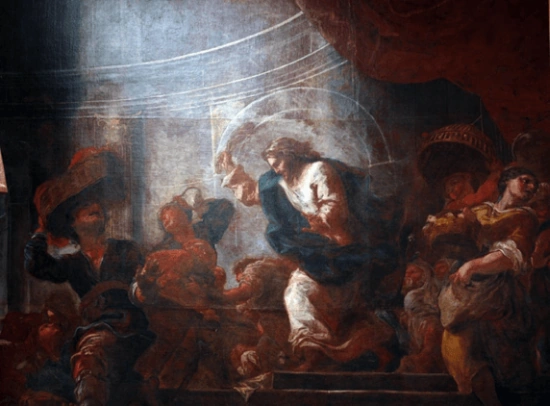1
Y Jacob siguió su camino, y le salieron al encuentro ángeles de Dios.
2
Y dijo Jacob cuando los vio: El campamento de Dios es éste; y llamó el nombre de aquel lugar Mahanaim.
3
Y envió Jacob mensajeros delante de sí a Esaú su hermano, a la tierra de Seir, campo de Edom.
4
Y les mandó diciendo: Así diréis a mí señor Esaú: Así dice tu siervo Jacob: Con Labán he morado, y me he detenido hasta ahora;
5
y tengo vacas, y asnos, y ovejas, y siervos y siervas; y envío a decirlo a mi señor, por hallar gracia en tus ojos.
6
Y los mensajeros volvieron a Jacob, diciendo: Vinimos a tu hermano Esaú, y él también viene a recibirte, y cuatrocientos hombres con él.
7
Entonces Jacob tuvo gran temor, y se angustió; y partió el pueblo que tenía consigo, y las ovejas y las vacas y los camellos, en dos cuadrillas;
8
y dijo: Si viniere Esaú a una cuadrilla y la hiriere, la otra cuadrilla escapará.
9
Y dijo Jacob: Dios de mi padre Abraham, y Dios de mi padre Isaac, el SEÑOR, que me dijiste: Vuélvete a tu tierra y a tu natural, y yo te haré bien.
10
Menor soy que todas las misericordias, y que toda la verdad que has hecho con tu siervo; que con mi bordón pasé este Jordán, y ahora estoy sobre dos cuadrillas.
11
Líbrame ahora de la mano de mi hermano, de la mano de Esaú, porque le temo; que por ventura no venga, y me hiera, la madre con los hijos.
12
Y tú has dicho: Yo te haré bien, y pondré tu simiente como la arena del mar, que no se puede contar por la multitud.
13
Y durmió allí aquella noche, y tomó de lo que le vino a la mano un presente para su hermano Esaú.
14
Doscientas cabras y veinte machos cabríos, doscientas ovejas y veinte carneros,
15
Treinta camellas paridas, con sus hijos, cuarenta vacas y diez novillos, veinte asnas y diez borricos.
16
Y lo entregó en mano de sus siervos, cada manada de por sí; y dijo a sus siervos: Pasad delante de mí, y poned espacio entre manada y manada.
17
Y mandó al primero, diciendo: Si Esaú mi hermano te encontrare, y te preguntare, diciendo: ¿De quién eres? ¿Y adónde vas? ¿Y para quién es esto que llevas delante de ti?
18
Entonces dirás: Presente es de tu siervo Jacob, que envía a mi señor Esaú; y he aquí también él viene tras nosotros.
19
Y mandó también al segundo, y al tercero, y a todos los que iban tras aquellas manadas, diciendo: Conforme a esto hablaréis a Esaú, cuando le hallareis.
20
Y diréis también: He aquí tu siervo Jacob viene tras nosotros. Porque dijo: Apaciguaré su ira con el presente que va delante de mí, y después veré su rostro; por ventura le seré acepto.
21
Y pasó el presente delante de él; y él durmió aquella noche en el real.
22
Y se levantó aquella noche, y tomó sus dos mujeres, y sus dos siervas, y sus once hijos, y pasó el vado de Jaboc.
23
Los tomó, pues , y los pasó el arroyo, y pasó lo que tenía.
24
Y se quedó Jacob solo, y luchó con él un varón, hasta que el alba subía.
25
Y cuando el varón vio que no podía con él, tocó la palma de su anca, la palma del anca de Jacob se descoyuntó luchando con él.
26
Y dijo: Déjame, que el alba sube. Y él dijo: No te dejaré, si no me bendices.
27
Y él le dijo: ¿Cómo es tu nombre? Y él respondió: Jacob.
28
Y él dijo: No se dirá más tu nombre Jacob, sino Israel; porque has peleado con Dios y con los hombres, y has vencido.
29
Entonces Jacob le preguntó, y dijo: Declárame ahora tu nombre. Y él respondió: ¿Por qué preguntas por mi nombre? Y lo bendijo allí.
30
Y llamó Jacob el nombre de aquel lugar Peniel; porque vi a Dios cara a cara, y fue librada mi alma.
31
Y le salió el sol cuando pasaba a Peniel; y cojeaba de su anca.
32
Por esto no comen los hijos de Israel, hasta hoy día, del tendón que se contrajo, el cual está en la palma del anca; porque tocó a la palma del anca de Jacob en el tendón que se contrajo.








